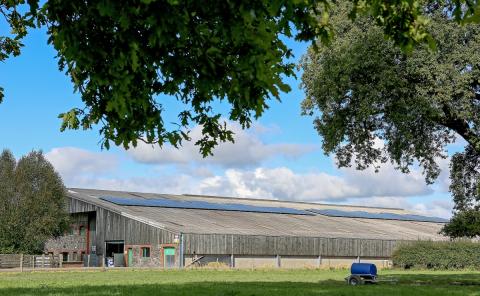Farm profits can be eroded by rising energy prices, input costs and fuel bills, so most farmers are now looking for ways to save money in these areas. Many are moving towards low carbon farming, which will not only improve their business margins, but also provide significant environmental benefits.
Low carbon farming aims to reduce greenhouse gas emissions and improve energy efficiency. As well as helping to combat climate change, shrinking the carbon footprint of a farm can help save money on fuel bills and limit rises in energy costs, and can often be achieved at low or no cost, while having a significant effect on business performance.
Jon Swain, senior engineer at the Farm Energy Centre says: “Becoming more energy efficient is not just a way of saving money, good energy efficiency often translates as good farming practice too.”
“Energy is power multiplied by time, this gives two opportunities to save energy – reduce the power needed to do a job and/or reduce the time the power is needed. Switching things off will instantly reduce energy consumed.”
Lights, pumps and vehicles are often left on unnecessarily. A tractor with its engine running can consume up to two litres of diesel an hour, so turning it off instead of leaving it idle will save money without compromising performance. Automatic controls are also a helpful tool, such as using a time switch and dusk to dawn sensor to control lights, which only cost about £50 plus fitting. There are a huge variety of sensors and control systems, some of which can be controlled by smartphones.
Jon adds: “You can also use your phone to measure and monitor your energy consumption with fuel tank sensors or automatic electricity meters. It is often said that if you can’t measure it you can’t control it properly or even know if it is worth doing. Checking your consumption against last night, week, month or year will quickly highlight whether you are improving efficiency or not.”
Farmers are also urged to shop around for the best energy deals as buying energy cheaper is a good way of saving money without changing anything.
“Use a broker that has access to a variety of energy suppliers who can find one that suits your needs, ironically sometimes the cheapest price is not always the best if the service is poor.”
Reducing unnecessary journeys between fields or farms and using the right equipment can also save energy. Using the right size tractor for the task being undertaken is an important consideration, as well as operating the tractor at the correct power and engine speed for the job. Paying attention to tyre pressures, tractor weights and maintenance will all help to keep diesel bills down. Over or under inflation of tyres by 20% can lead to overall efficiency loss of around 25%.
“If you have regular tasks then training the driver in efficient driving techniques is worth the investment. You could even set them targets with an incentive to aim for.”
Farmers can also consider generating their own energy by installing wind turbines, solar panels and anaerobic digesters. As well as serving the energy needs of the farm, they can also earn extra income if surplus electricity is sold back to the national grid.
Gelli Aur Energy Review
Farming Connect’s new innovation sites are required to undertake base line studies to outline their performance in key areas. At Coleg Sir Gar Farm, Gelli Aur, Llandeilo, an energy review completed in September 2015 found that although it was already performing above average Welsh dairy farms, there were ways for the 520-cow unit to become more energy efficient.
Installing a small heat recovery unit to pre-heat tank wash water would save £703 a year in electricity costs, while upgrading the plate heat exchanger to further cool milk before entering the tank would save £941 a year and pay back in just under a year. Also, checking and cleaning the compressor condensers on the bulk tanks periodically would cost nothing and save £106 a year on each tank. Implementing all these changes, including switching to the lowest available Economy 7 tariff would save £7,063 a year, or 0.25pence per litre of milk produced.
Other areas looked into included ways to cut down on diesel consumption and harvesting rainwater from a shed roof to save £3,215 on current mains water charges.

